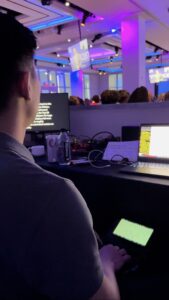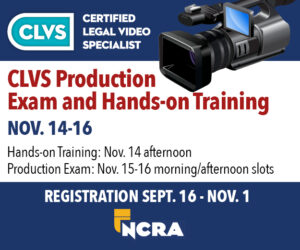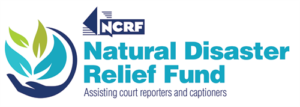The JCR Weekly reached out to NCRA member Carol Studenmund, RDR, CRR, CRC, Chair of NCRA’s Certified Realtime Captioner (CRC) Committee, a broadcast captioner from Portland, Ore., to talk about why captioners should consider earning the CRC.
Tell us a little about your background. How did you get involved in the captioning profession?
Our company, LNS Court Reporting is celebrating its 30th anniversary this month! We expanded into the captioning world back in 1992. It was a natural progression for our business. My first big gig was helping to caption a regional conference of Self-Help for Hard-of-Hearing People here in Portland, where I met NCRA member Deanna Baker, RMR, a broadcast captioner from Flagstaff, Ariz.
Who would you say would benefit most by earning the CRC in this profession?
Our company is seeing more and more contract opportunities that specifically ask for proof of our captioners having the CRC. We only schedule captioners with the CRC for court work we caption in our state. We work both on-site and remotely for our court system. All of that adds up to the fact that we need more captioners who have the CRC.
Do you see an increase in the demand for certified captioners in the near future and if so, why?
More and more contract opportunities will have this requirement. Our potential clients know there is a wide variety in caption quality. They can’t afford to spend their tight public money on services that are not provided by a qualified captioner.
How has earning the CRC helped you professionally?
I earned my CRR back in 1993. I took the Written Knowledge Tests for the Certified Broadcast Captioner and Certified CART Provider in 2009. [Members who held the CBC and/or CCP before Jan. 1, 2016, were automatically transitioned to holding the CRC.] Certifications always give the person who earns them confidence in his or her skills. I haven’t looked for a job in 30 years, but I have hired many people in that time. And when I see a certification, I know a good deal about the captioner’s capabilities right off the bat. And maintaining my certifications has led to me knowing captioners and court reporters across the country, and exposed me to the latest trends and technology for our professions.
What do you advise someone considering earning the CRC to encourage them to do so?
Get busy! This certification has three legs: the Written Knowledge Test, the Skills Test, and a Workshop. They’re all essential to the certification program. Our captioning profession has grown for more than three decades. And during that time, we’ve gone from a community of pioneers, who truly did make it up as they went, to a profession that is depended upon by millions of people all over our country. Our consumers want a way to know they are working with a qualified service provider.
Are you eligible for the CRC exception? Learn more here.











